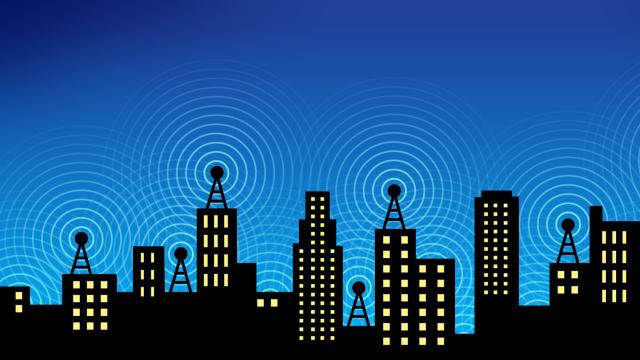
Last month, Federal Communications Commission Chair and ex-Verizon lawyer Ajit Pai callously repealed the tenets of net neutrality. Despite the high volume of calls into Congress, widespread protests at Verizon locations and a months-long mobilization by the online coalition known as Team Internet, the FCC went ahead and jeopardized the internet as we know it.
Scores of groups and organizations are already working hard to convince Congress to reverse the FCC's decision. But an altogether different approach is also underway: Pushing local communities to form their own municipal broadband utility in order to get around the Big Telecom stranglehold.
In communities with a municipal broadband utility, the local government provides, or partially provides, broadband internet access to all citizens. In these towns and cities, internet is treated as a public utility – one that is city-owned and city-operated, much like electricity, water and garbage pick-up.
Cities have been working toward the community broadband goal for some time. According to Community Networks, a project of the Institute for Local Self-Reliance, more than 95 U.S. communities already have a publicly-owned Fiber to the Home (FTTH) network reaching most of the community. Some 110 communities in 24 states have a publicly-owned network offering at least 1 Gigabit of services, and 77 communities have a publicly-owned cable network that reaches most of the community.
Still, as the shift to community-owned broadband internet gathers steam, a few disadvantages remain – like its prohibitive cost. The city of Fort Collins, Colo., had to come up with $150 million in bond money to amend the city charter and allocate funds for its broadband construction project. The price of broadband implementation in Seattle, Wa., is somewhere between $480 to $665 million, according to a city-commissioned study.
However, municipalities have gotten creative in their quest to fund these projects. The majority of cities use revenue bonds, but other cities have also turned to bank financing, interdepartmental loans, grants, an increase in taxes, and capital reserve savings.
Big Telecom and other private companies often claim that municipal broadband will lead to government surveillance of website usage through regulatory policy. In response to such concerns, Seattle launched a “digital privacy initiative” that defines exactly what information is shared with government, and how. Furthermore, while private ISPs love to chastise the government for overreach of power, they forget to mention that they openly share customer information with advertisers, governments and law enforcement without warrants or permission from users.
On the other hand, when a community provides broadband internet access, elected officials can be held accountable for misuse, unlike corporate behemoths like Comcast and Verizon.
Now, more and more individuals and communities are starting to ask the question: Is municipal broadband internet better than our current options? Looking again at Seattle as an example, there are currently three ISPs operating in that city. Comcast offers 150 Mbps (Megabits per second) download service, Centurylink started rolling out FTTP gigabit services in two neighborhoods serving 22,000 customers at a cost of $150 a month, and Wave is piloting FTTP service to 600 customers.
Meanwhile, a feasibility study recently concluded that a city-owned public internet service could provide 1 Gbps (Gigabit per second) to every neighborhood in Seattle for a monthly charge of $45 per household. One might consider the economic argument, not to mention the privacy one, settled.
Already there are several problems with the private industry approach. First, individuals are paying a substantially higher amount for vastly degraded service (150 Mbps compared to 1 Gbps). Second, there is not uniform access based on equity; the current ISPs are offering fast service to only a select group of customers. Lastly, if a resident is lucky enough to be offered fast service, s/he must pay the hefty price tag of around $150 a month, triple the broadband cost.
Private ISP companies understand the repercussions of community-owned internet for their businesses. As such, they have gone to great lengths to combat these progressive initiatives. For example, as Fort Collins prepared to vote on its ballot measure to allocate money for community-owned broadband service, the telecom industry spent over $900,000 in a failing effort to defeat the measure.
However, citizens face an additional hurdle for creating widespread city-owned or community-owned internet service: It remains against the law in many states. Currently, 21 states have laws making it difficult or illegal to create community broadband networks. Therefore, repealing this anti-broadband legislation is a giant first step that residents in those states could take.
Citizens will also need to take action in the courts. “Nearly 20 state attorneys generals [sic] have announced they will sue the FCC over their decisions to repeal Title II net neutrality rules and to prevent state’s from taking action to protect net neutrality. Free Press and other nonprofit organizations will also sue,” warned the website Popular Resistance.
Community-owned broadband is a great alternative to the impositions of private companies and their mono- or duopolistic price gouging. In addition to providing a service outside of the hands of profiteering private industry, communities that welcome broadband are taking steps to become more autonomous and self-reliant. It's little surprise that more residents are now acting to move their cities' internet service in this direction – creating a web that is more dependable, affordable and equitable.
3 WAYS TO SHOW YOUR SUPPORT
- Log in to post comments













